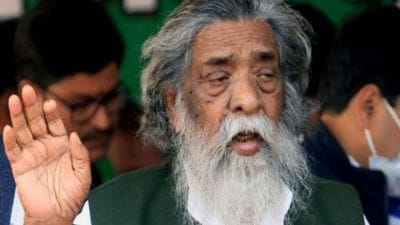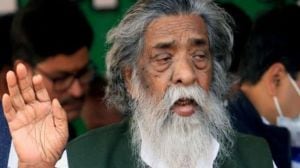Maharashtra govt revokes two GRs on 3-language policy that inducted Hindi
The CM also announced the formation of a committee led by Dr Narendra Jadhav to take a relook into the three-language policy in primary sections
 According to the New Education Policy (NEP) floated by the Centre, school education is divided into a 5+3+3+4 pedagogical and curricular structure, replacing the current 10+2 format.
According to the New Education Policy (NEP) floated by the Centre, school education is divided into a 5+3+3+4 pedagogical and curricular structure, replacing the current 10+2 format.Ahead of the monsoon session of the Maharashtra legislature that begins Monday, Chief Minister Devendra Fadnavis revoked the government resolutions (GRs) issued on April 16 and June 17 on the contentious three-language policy, inducting Hindi as the third language in primary schools. The first GR had made Hindi mandatory third language for students from Class 1 to 5, while the second one made it optional. The CM also announced the formation of a committee led by Dr Narendra Jadhav to take a relook into the three-language policy in primary sections.
The CM’s announcement on Sunday coincided with Shiv Sena UBT’s state wide agitation where activists burnt copies of the controversial GRs to protest the “imposition” of Hindi at primary school level.
Addressing reporters at the Sahayadri Guest House after a cabinet meeting, Fadnavis said, “We discussed the three-language policy at length in the cabinet and decided to cancel the GRs issued on April 16 and June 17, 2025. A committee will be formed led by Dr Narendra Jadhav to determine from which class the three-language policy should be implemented, how the implementation should take place, and what choices should be given to students… Based on the report by this committee, the state government will take a final decision.”
Flanked by deputy chief ministers Eknath Shinde and Ajit Pawar, Fadnavis said, “Our government had always given the highest priority to Marathi, making it mandatory. As far as Hindi is concerned, we had made it the third language, which was optional.” He also emphasised that they had also indicated that if students wished, they could explore any Indian language other than Hindi as third language.
The chief minister expressed disappointment over the “ugly politics” played by the Opposition and pointed out that the Maha Vikas Aghadi (MVA) regime, led by Shiv Sena (UBT) Chief Minister Uddhav Thackeray, had accepted the three-language formula report of Dr Raghunath Mashelkar without even questioning. It was Thackeray’s regime, supported by then Congress and undivided NCP that agreed to make English and Hindi compulsory, Fadnavis said.
The chief minister also showed documentary proof along with visuals to show how the then CM Uddhav Thackeray had accepted the 150-page Mashelkar report and ordered a sub-committee to frame rules for its effective implementation.
According to Fadnavis, “Apart from learned experts and academics, deputy Shiv Sena (UBT) leader Vijay Kadam was also part of committee, which recommendated English and Hindi language in schools from Class 1.”
The CM said that it was the government’s endeavour to arrive at a consensus on the issue and accordingly School Education Minister Dadasaheb Bhuse reached out to leaders across parties. “We don’t want to bring politics in education. The three-language policy was to help Marathi medium students score extra credits,” Fadnavis said.
While the government seemed to not give in to the pressure by the Opposition and issued a revised GR on June 17, it finally decided to revoke the GRs, following intense heat from Opposition MVA as well as alliances of the ruling Mahayuti.
Deputy CM Ajit Pawar had also opposed the imposition of Hindi, while it is learnt that Shinde was also not happy with decision as he felt the language row gave Shiv Sena ( UBT) a fresh lease of life.
The decision also comes ahead of the July 5 agitation called by Maharashtra Navnirman Sena led by Raj Thackeray and Shiv Sena (UBT) led by Uddhav Thackeray to protest the language policy. The Thackerays have been raising the Marathi asmita (regional pride) to counter the BJP-led government.
Soon after the announcement by Fadnavis, MNS chief Raj Thackeray said, “We believe both controversial GRs on three-language policy have been cancelled for good. It better be, or else, we will not allow the Narendra Jadhav committee to work.”
How the row erupted
The controversy began with the first GR issued on April 16, which introduced Hindi as third language from Class 1 to 5. The decision sparked widespread criticism, with many accusing the government of imposing Hindi on non-Hindi-speaking students. This was also considered as a cultural onslaught by many, leading to major political backlash.
On April 22, School Education Minister Dada Bhuse announced that Hindi would not be mandatory and assured that a new GR would be issued to clarify the three-language formula. However, the revised GR on June 17 stated that Hindi will “generally” be the third language and allowed students to opt for any other Indian language, if there are at least 20 students per class opting for the alternative. Many argued that this restrictive clause effectively made Hindi as the default third language, leading to further outbursts.
Amid growing concerns, Chief Minister Devendra Fadnavis intervened on June 23 and held a high-level meeting, after which he announced that a final decision on the implementation of the three-language formula would be made only after comprehensive consultations with all stakeholders — including literary figures, language experts, political leaders and others.
However, on June 26, Bhuse declared that students in Class 1 and 2 would only be taught third language only in speaking form. Reading and writing components would be introduced starting from Class 3. Bhuse also reiterated that Hindi was not mandatory and that a school can decide to teach any of the 22 Indian languages as a third language. He clarified that the restriction of 20 students is only if the government has to provide teachers. In case of less number of students, the schools will have to depend on online platforms to teach the third language, he said.












